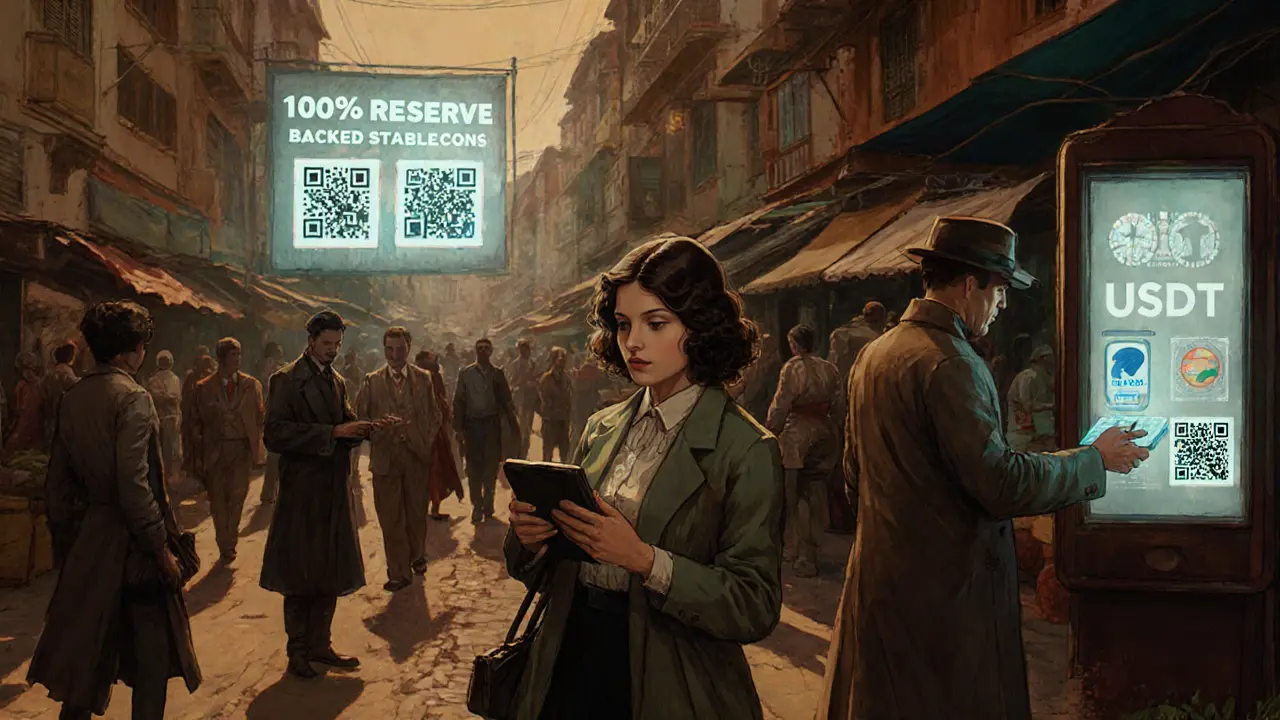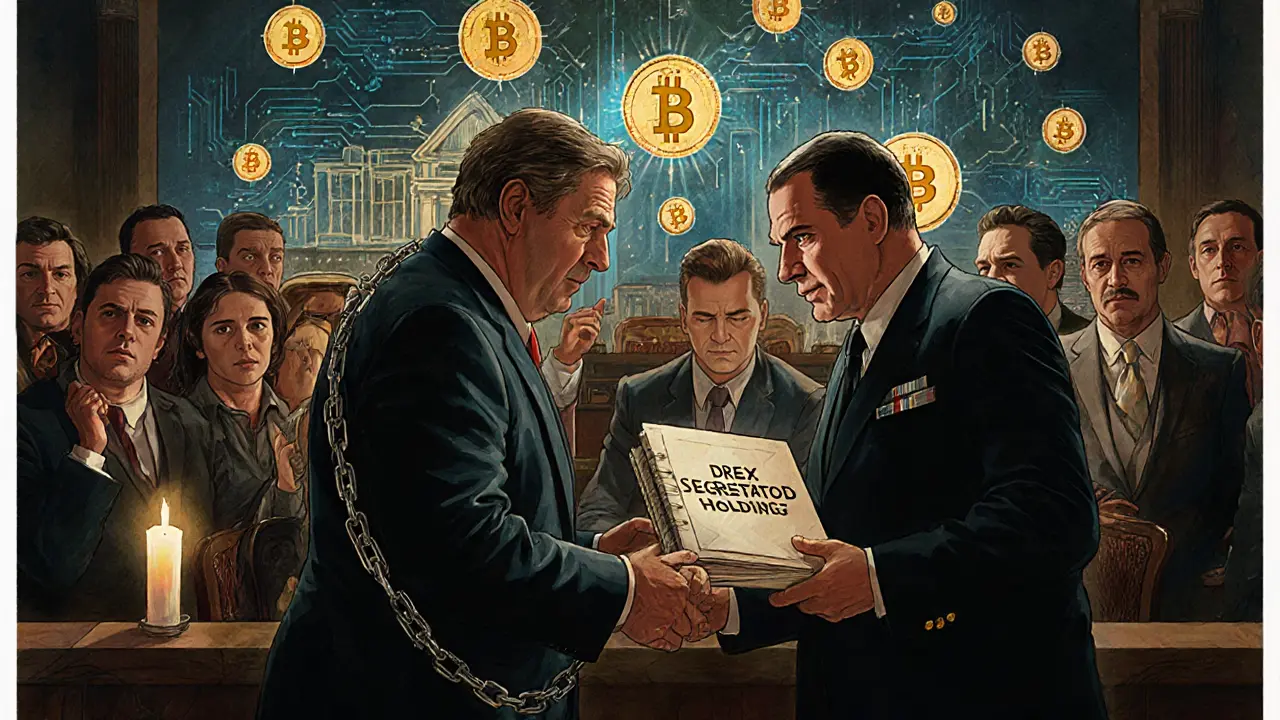Brazil Crypto Tax Calculator
Calculate Your Tax
Brazil's 2025 regulations require capital gains tax on crypto transactions exceeding R$35,000 in gains per month.
Tax Result
Enter your transaction values to see your tax liability
When you buy Bitcoin or trade stablecoins in Brazil, you’re not gambling in the wild west-you’re operating under one of the strictest, most structured crypto frameworks in Latin America. Since June 2023, the Brazilian Virtual Assets Law (BVAL) has turned what was once a legal gray zone into a tightly regulated financial ecosystem. This isn’t just about banning shady operators. It’s about building a system where consumers can use crypto without being left exposed when things go wrong.
Who’s in Charge of Crypto in Brazil?
The Central Bank of Brazil (BCB) is the main player. It doesn’t just oversee banks-it now runs the entire crypto infrastructure. Virtual Asset Service Providers (VASPs), which include exchanges, wallet providers, and crypto ATMs, must be officially authorized by the BCB to operate. No license? No business. That’s not a suggestion. It’s the law. But it’s not just the Central Bank. The Securities and Exchange Commission (CVM) steps in when crypto acts like a security-like tokens tied to profits or investment contracts. And the Financial Activities Control Council (COAF) watches for money laundering. If a crypto platform moves suspicious cash, COAF gets notified. This three-layer system means no loophole big enough for a scam to slip through.What Do You Need to Do as a Crypto User?
You don’t need to apply for a license. But you do need to know who you’re dealing with. Every legal crypto platform in Brazil must follow strict Know Your Customer (KYC) rules. That means showing your ID, proof of address, and sometimes even explaining where your money came from. It’s not just bureaucracy-it’s protection. If your account gets hacked or a platform disappears, regulators have a paper trail to follow. You also can’t avoid taxes. The Brazilian Revenue Service tracks crypto transactions. If you sell Bitcoin for a profit, you owe capital gains tax. Platforms report this data automatically to the government. Ignorance won’t save you from penalties.Stablecoins Rule the Market-And Regulators Are Watching Closely
Here’s something most people don’t realize: 90% of all crypto transactions in Brazil are in stablecoins-USDT, USDC, and others pegged to the U.S. dollar. Why? Because Brazilians use them to protect savings from inflation, send money across borders, and buy goods online. They’re the real backbone of the market. That’s why the BCB is focusing its next moves on stablecoins. In 2025, new rules will force issuers to hold full reserves in safe assets (like government bonds), not risky investments. They’ll also have to publish monthly audits. If a stablecoin issuer can’t prove it has the cash to back every token, it gets shut down. This isn’t about killing innovation. It’s about stopping the next TerraUSD collapse from wiping out thousands of Brazilian savers.
How Does Brazil Protect You If Something Goes Wrong?
Brazil doesn’t have a “crypto insurance fund” like some countries. But it has something stronger: legal accountability. If a licensed exchange freezes your funds or refuses to let you withdraw, you can file a complaint with the BCB. They investigate. They can fine the company. They can revoke its license. The Regulatory Sandbox-launched in May 2024-is another layer of protection. New crypto products, like lending platforms or tokenized stocks, can’t launch overnight. They must first be tested under BCB supervision. If users lose money during the test, the company pays. If the product is unsafe, it’s killed before it reaches the public. This is different from the U.S., where startups often launch first and get sued later. In Brazil, you’re protected before you even sign up.Foreign Exchange Rules Are Now Tied to Crypto
On September 24, 2025, the BCB introduced new foreign exchange rules that quietly changed the game for crypto users. While the rules don’t mention crypto directly, they affect anyone who uses crypto to move money across borders. Now, any platform that lets you buy dollars, euros, or other foreign currencies-whether through crypto or traditional methods-must be licensed. Transactions over $10,000 are blocked unless they go through approved channels. All transaction data must be reported to the government. That means if you’re using a foreign exchange platform to convert Bitcoin to USD and send it abroad, you’re now under the same rules as a bank. Many offshore crypto platforms that served Brazilian users are scrambling to comply-or leaving the market entirely.
What’s Coming in 2025-2026?
The BCB’s 2025-2026 Regulatory Agenda makes one thing clear: crypto isn’t going away. It’s being built into Brazil’s financial core. By the end of 2025, the CVM will launch a public consultation on asset tokenization-think real estate, stocks, or bonds turned into digital tokens. This could let Brazilians buy shares of a farm or a building with just a few clicks, all under strict legal oversight. The Drex platform, a government-led blockchain system for tokenized bank deposits and securities, is already testing with major banks. It’s not a central bank digital currency (CBDC), but it’s close. It shows Brazil is building the infrastructure for a future where digital money and traditional finance work together.Why This Matters for Global Users
If you’re a crypto company outside Brazil, you can’t treat it like other Latin American markets. You can’t just set up a website and hope users find you. You need local compliance, local licenses, and local reporting. Brazil’s rules are stricter than the EU’s MiCA framework in some areas. They’re more proactive than the U.S.’s patchwork of state laws. If you want to serve Brazilian customers, you need to play by their rules-or lose access to one of the biggest crypto markets in the region.What You Should Do Right Now
- Only use platforms licensed by the BCB. Check the official registry on the Central Bank’s website.
- Never send crypto to an unregistered exchange-even if it promises higher returns.
- Keep records of every transaction. You’ll need them for taxes and disputes.
- Be wary of platforms offering crypto-to-fiat transfers in USD or EUR without clear licensing. They may be violating new forex rules.
- Stay updated. The BCB and CVM publish public consultations. If you care about your rights, join them.
Brazil didn’t ban crypto. It didn’t ignore it. It took the chaos and turned it into structure. That’s not just regulation-it’s responsibility. And for users, that’s the best kind of protection.
Is cryptocurrency legal in Brazil?
Yes, cryptocurrency is fully legal in Brazil. Since June 2023, the Brazilian Virtual Assets Law (BVAL) has provided a clear legal framework. Crypto assets are recognized as digital assets, not legal tender, but they can be bought, sold, traded, and used for payments through licensed providers.
Do I need to pay taxes on crypto in Brazil?
Yes. Any profit from selling or trading crypto is subject to capital gains tax. Platforms licensed by the Central Bank automatically report transaction data to the Brazilian Revenue Service. If you make more than R$35,000 in crypto sales in a month, you must file a tax return. Failing to report can lead to fines or legal action.
Can I use Binance or Coinbase in Brazil?
Binance and Coinbase operate in Brazil only if they are licensed by the Central Bank. As of October 2025, Binance has obtained its license and complies with local KYC and reporting rules. Coinbase is not yet licensed and does not offer services to Brazilian residents. Always check the BCB’s official registry before using any platform.
Are stablecoins safe in Brazil?
Stablecoins are the most regulated part of Brazil’s crypto market. Issuers must hold 100% reserves in low-risk assets like government bonds and submit monthly audits. Unbacked or undercollateralized stablecoins are illegal. The BCB is actively shutting down non-compliant issuers, making Brazil’s stablecoins among the safest in the world.
What happens if a crypto exchange goes bankrupt in Brazil?
If a licensed exchange fails, the Central Bank steps in. Customer assets are segregated from the company’s own funds, meaning your crypto or fiat holdings aren’t used to pay the company’s debts. Regulators work to return assets to users, and in cases of fraud or mismanagement, criminal charges can be filed against executives. This level of protection doesn’t exist in most other countries.
Can I send crypto from Brazil to another country?
You can, but only through licensed platforms that comply with new foreign exchange rules. As of September 2025, any cross-border transfer-whether in crypto or fiat-must go through approved channels. Single transactions above $10,000 are blocked unless pre-approved. Many offshore exchanges now refuse Brazilian users because they can’t meet these requirements.
Is the Drex platform a central bank digital currency (CBDC)?
No. Drex is a distributed ledger infrastructure for tokenized bank deposits, loans, and government securities. It’s not a digital version of the Brazilian real. It’s a backend system used by banks and financial institutions-not a currency you can hold in your wallet. The BCB has confirmed Drex is not a CBDC and will not replace cash or bank accounts.
What should I do if I’ve been scammed on a crypto platform in Brazil?
Report it immediately to the Central Bank of Brazil’s consumer protection unit and to COAF (Financial Activities Control Council). Provide all transaction IDs, screenshots, and communication records. If the platform is licensed, the BCB can freeze its assets and initiate recovery. If it’s unlicensed, you may need to file a police report for fraud. Do not rely on social media groups or influencers for help-official channels are your only real path to recovery.

Ali Korkor
October 27, 2025 AT 16:08Finally, someone gets it. Brazil’s not just regulating crypto-they’re building trust. No more sketchy exchanges, no more rug pulls. If you’re using crypto, this is how it’s supposed to work.
Serena Dean
October 28, 2025 AT 14:29Love that the BCB is forcing stablecoin issuers to hold real reserves. Too many people lost everything in 2022 because someone thought ‘algorithmic’ meant ‘magic’. This is common sense with teeth.
Elliott Algarin
October 29, 2025 AT 21:00It’s funny how people scream about ‘freedom’ when it comes to crypto, but when the system actually protects them, they call it censorship. Brazil didn’t kill innovation-they gave it a foundation. You can’t build a house on sand, no matter how cool the bricks look.
John Murphy
October 31, 2025 AT 14:45the stablecoin thing is huge honestly
people use them to survive inflation not to trade
if they go down its not just losses its real life damage
good they’re locking it down
Akinyemi Akindele Winner
November 1, 2025 AT 15:57Brazil? Regulating crypto? Pfft. Next they’ll make you wear a helmet to ride a bicycle. They think they’re saving people but they’re just building a cage with gold-plated bars. The real freedom is in the chaos, baby. Let the market eat the weak.
Patrick De Leon
November 2, 2025 AT 14:44Irish banks would kill for this level of oversight. The EU’s MiCA is a joke compared to this. Brazil’s got more spine than half of Europe combined. Respect.
MANGESH NEEL
November 4, 2025 AT 12:15Oh wow so now we’re supposed to trust the government with our crypto? What a joke. You think they’re protecting you? They’re just collecting your data so they can freeze your account if you buy too much Bitcoin. This isn’t regulation-it’s surveillance with a smiley face. Wake up people.
Sean Huang
November 5, 2025 AT 22:11the central bank is watching every transaction... and the Drex system? That’s not a backend-it’s the first step to a digital ID that ties your wallet to your social credit score. They’re not building infrastructure. They’re building the surveillance state. And you’re clapping? 😔
madhu belavadi
November 7, 2025 AT 03:05so you’re saying i have to pay taxes on my crypto gains? but i didn’t even cash out... i just hodled... this is so unfair
Dick Lane
November 8, 2025 AT 06:58the segregation of customer assets is the most important part here
in the us if an exchange goes down your coins vanish
in brazil they’re legally locked away from the company’s debt
that’s not luck-that’s design
Norman Woo
November 8, 2025 AT 20:58they say stablecoins are safe now but what if the bcb gets hacked? or what if they just decide to ban usdt next week? this feels like putting all your eggs in one basket and calling it a ‘regulatory sandbox’
James Young
November 10, 2025 AT 20:30Anyone who thinks this is ‘good regulation’ is naive. This is the same government that banned cash withdrawals during the 2015 crisis. Now they’re doing it with crypto. They don’t want you to have freedom-they want control. Don’t be fooled by the ‘consumer protection’ buzzwords. This is a power grab.
Chloe Jobson
November 11, 2025 AT 08:53the segregation of assets + mandatory audits + sandbox testing = institutional-grade safety. This is what DeFi should’ve looked like from the start. Brazil’s showing the world how to do it right.
Andrew Morgan
November 12, 2025 AT 04:46my cousin in São Paulo just used USDT to pay her landlord last week. no bank fees, no delays, no drama. this isn’t finance tech-it’s survival. and yeah, the rules are tight but they’re keeping people from getting wiped out. i’m not mad, i’m impressed.
Michael Folorunsho
November 12, 2025 AT 22:26Let’s be honest-this is just a warm-up. The real goal is to kill decentralized finance. Once they control the gatekeepers, they control the money. You think you’re protected? You’re just a customer in a system designed to never let you leave.
Roxanne Maxwell
November 13, 2025 AT 11:56as a woman who’s seen too many friends lose money on shady exchanges, i’m grateful for this. no more ‘trust me bro’ crypto scams. if you want to play, you play by the rules. fair enough.
Jonathan Tanguay
November 14, 2025 AT 11:51people don’t understand that the real innovation here isn’t the tech-it’s the legal structure. Most countries treat crypto like a tax loophole or a gambling den. Brazil treats it like a financial instrument. That’s why their market is growing while others are collapsing. And yes, the KYC is annoying but if you’re doing something legit you shouldn’t fear paperwork. The fact that you’re complaining about ID verification proves you’re either hiding something or you’re just lazy.
Ayanda Ndoni
November 14, 2025 AT 13:02so what, now i have to file taxes on my crypto? i just bought some btc to pay for my coffee. why does the government care? this is so much hassle for no reason.
Abby Gonzales Hoffman
November 14, 2025 AT 14:39if you’re using crypto to send money home to family in Brazil, this is the best thing that’s happened to you. no more 15% fees, no more 3-day delays. stablecoins with real backing? That’s freedom with guardrails. Stop calling it control-it’s inclusion.
Ali Korkor
November 15, 2025 AT 14:22you guys are missing the point. this isn’t about government control-it’s about giving ordinary people a fighting chance. when your savings can’t be wiped out by a single scammer, that’s not oppression. that’s justice.